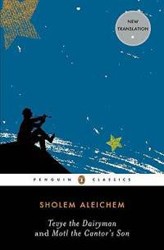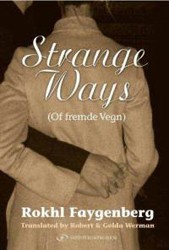By
– December 5, 2011
The Holocaust wiped out East European Jewry and the way of life of millions of peasants, small merchants, craftsmen, peddlers — ordinary people. But even before the Holocaust, change was slowly coming to the provincial towns and cities of Poland, under Russian rule in the years before World War I. This is the world that Yehoshue Perle, an active figure in Warsaw’s literary circles, so effectively evokes in his landmark novel Yidn fun a gants yor, translated as Ordinary Jews by Shirley Kumove.
Mendl Shonash, the only child of the mismatched second marriages of both his parents, lives in an unnamed city in Poland that closely resembles Perle’s hometown of Radom. His family’s life follows the routines and rituals that had defined Jewish life in Poland for centuries. His illiterate Tatteh — father — works long and often unrewarding days as a hay merchant, davening morning and evening and taking Mendl to shul with him on the holidays. Restless and always on the lookout for a better house, Mammeh cannot forget better days with her departed first husband, when she had a home with brass door handles. On the brink of adolescence, Mendl is an observant narrator of the life buzzing around him.
Mendl’s life revolves around his parents’ families — Tatteh’s rich sister, Mammeh’s sister and parents, his adult half-sisters and brothers, who turn up at the holidays; the hangers-on and maids who appear at the house; his friends from cheder or the neighborhood. The relationships are dense and sometimes difficult but nevertheless vital in this tightly knit community. News travels fast, and so do its consequences. The others, the goyim, are also a presence, with daily life and business often bringing them and the Jews together.
Perle’s rich and vivid picture brings to life the smells and the grit, the mud and the homely meals, the curses and the struggle to piece a living together. But at the edges change is taking place. Mendl’s half-sisters and brothers arrive with their city attitudes and stylish clothes, a striking contrast to the unchanging habits of their parents. And when Mendl leaves the unquestioning cheder and enters a new school where he will learn Russian as well as read Hebrew newspapers, where the teachers’ heads are uncovered and a portrait of a beardless Baron de Hirsch stares down from the wall, he unwittingly becomes part of the change, too.
Writing in the 1930’s, Perle was already chronicling the past, preserving the hardscrabble existence of generations of poor Polish Jews. Their Yiddish flows with insults and curses, somewhat softened by numerous diminutives. In her translator’s notes, Shirley Kumove explains her approach to reproducing not only the meaning but also the lilt and nuances of the original. Her decision to retain the Yiddish of untranslatable terms, glossing them with English — “pshakrev cholera…son of a bitch, a cholera take it” — works very well; however, her English slang contractions — “are’ya” — sometimes sound forced and awkward rather than earthy. In his straightforward account of everyday life, from the steamy mating of two horses and Mendl’s own physical awakening to the small-time business dealings and family squabbles, Perle fulfills the promise of his title, Ordinary Jews, and gives today’s readers entry to a world that is now dust. Bibliography, glossary and notes, photographs.
Mendl Shonash, the only child of the mismatched second marriages of both his parents, lives in an unnamed city in Poland that closely resembles Perle’s hometown of Radom. His family’s life follows the routines and rituals that had defined Jewish life in Poland for centuries. His illiterate Tatteh — father — works long and often unrewarding days as a hay merchant, davening morning and evening and taking Mendl to shul with him on the holidays. Restless and always on the lookout for a better house, Mammeh cannot forget better days with her departed first husband, when she had a home with brass door handles. On the brink of adolescence, Mendl is an observant narrator of the life buzzing around him.
Mendl’s life revolves around his parents’ families — Tatteh’s rich sister, Mammeh’s sister and parents, his adult half-sisters and brothers, who turn up at the holidays; the hangers-on and maids who appear at the house; his friends from cheder or the neighborhood. The relationships are dense and sometimes difficult but nevertheless vital in this tightly knit community. News travels fast, and so do its consequences. The others, the goyim, are also a presence, with daily life and business often bringing them and the Jews together.
Perle’s rich and vivid picture brings to life the smells and the grit, the mud and the homely meals, the curses and the struggle to piece a living together. But at the edges change is taking place. Mendl’s half-sisters and brothers arrive with their city attitudes and stylish clothes, a striking contrast to the unchanging habits of their parents. And when Mendl leaves the unquestioning cheder and enters a new school where he will learn Russian as well as read Hebrew newspapers, where the teachers’ heads are uncovered and a portrait of a beardless Baron de Hirsch stares down from the wall, he unwittingly becomes part of the change, too.
Writing in the 1930’s, Perle was already chronicling the past, preserving the hardscrabble existence of generations of poor Polish Jews. Their Yiddish flows with insults and curses, somewhat softened by numerous diminutives. In her translator’s notes, Shirley Kumove explains her approach to reproducing not only the meaning but also the lilt and nuances of the original. Her decision to retain the Yiddish of untranslatable terms, glossing them with English — “pshakrev cholera…son of a bitch, a cholera take it” — works very well; however, her English slang contractions — “are’ya” — sometimes sound forced and awkward rather than earthy. In his straightforward account of everyday life, from the steamy mating of two horses and Mendl’s own physical awakening to the small-time business dealings and family squabbles, Perle fulfills the promise of his title, Ordinary Jews, and gives today’s readers entry to a world that is now dust. Bibliography, glossary and notes, photographs.
Maron L. Waxman, retired editorial director, special projects, at the American Museum of Natural History, was also an editorial director at HarperCollins and Book-of-the-Month Club.




